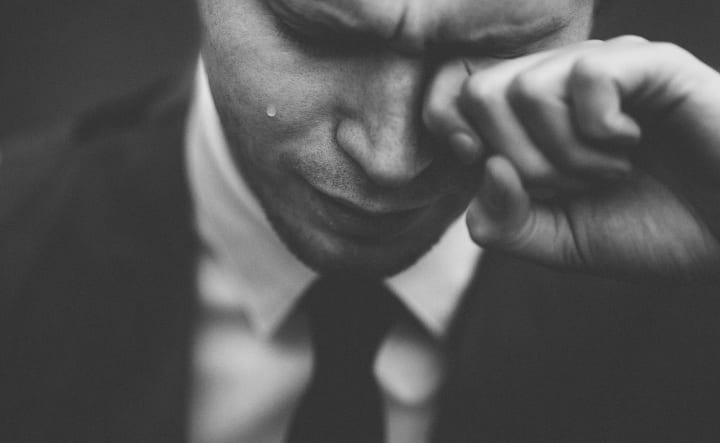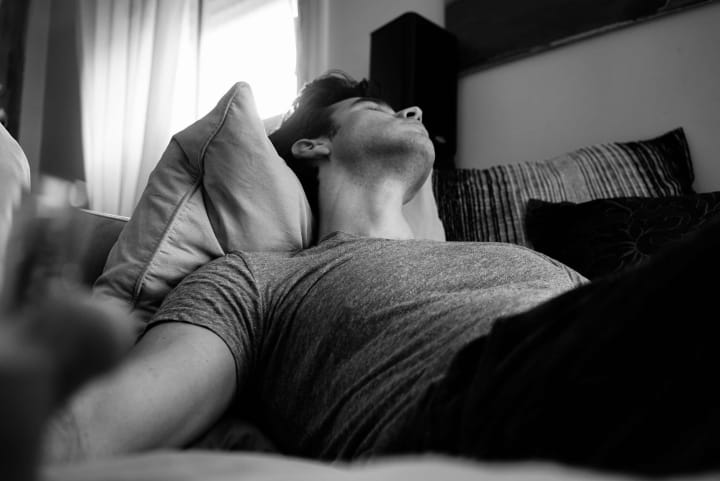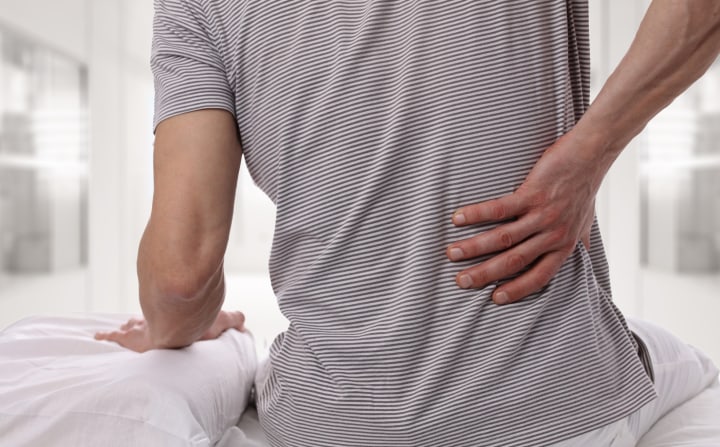Signs of Depression in Men
Depression is a silent disease; it’s a crippling, all consuming, and stigma filled disease, like much of mental health.

It may surprise you to learn that the leading cause of ill health and disability worldwide is depression. According to the World Health Organization, a staggering 300 million people suffer from depression. And that’s just diagnosed depression. Even more so for men than women, depression is deeply misunderstood and still widely prevalent. Although many indicators of depression in men and women may be similar, the disease will always manifest itself in different ways in different people. In a stigma-filled society, men can be especially vulnerable because like many of us, they may be resistant to observing and acknowledging the signs of depression and then seeking help. Depression is treatable, and it can be overcome. These key signs of depression in men are critical to recognize; it may just change your life.
Drastic Mood Changes

Everyone has bad days, but a sign of depression is persistent, unrelenting bad days. These drastic mood dives could keep you down for days or even weeks at a time. The sadness might feel like a weight holding you down, and it often is accompanied by more feelings of emptiness and hopelessness. Maybe it’s in your job, maybe it’s with your relationships, or maybe it’s just an all around feeling of emptiness, but that dreadful sensation can be a telltale sign of depression. Just remember you’re not alone. You’re among five million men in the US alone each year that struggle with depression. Emptiness can transform in a number of ways; it’s a feeling that’s hard to describe in words but feels all around dreadful and might feel like nothing in life gives you meaning. Be mindful of changes in your mood, especially mood dives for long periods of time — which is among the signs of depression in men.
Anger or Hostility
One way that male depression usually manifests differently than in women is through anger. Due to those lovely societal pressures we’ve created that depict depression as a weakness (hint: sarcasm), men who are depressed may experience sudden outburst of anger. The anger can range from straightforward hostility towards a loved one, to sensitivity to criticism, to road rage, and even violence. To fend off the feelings viewed as not being masculine, men often meet depression with rage, which can quickly make life feel as if it’s spiraling out of control. Although many men are reluctant to “admit” to feeling depressed, it takes real strength and enormous courage to reach out for help. And the help will always be there waiting as soon as you’re ready to open your eyes to it.
Too Much or Too Little Sleep

A change in your sleep cycle in general is a sign of depression in men to be wry of. Whether it’s excessive sleep or not enough hours, sleep is a deeply important healing practice for the mind and body. Perhaps you feel the urge to consistently get 12 or so hours of sleep a night. Even upon waking up, you don’t feel refreshed. Or maybe it’s quite the opposite and you can’t sleep at all. You experience interrupted sleep cycles, insomnia, or even nightmares when your head hits the pillow. Sleeping is another one of the most common symptoms reported for men and women suffering from depression.
Doing Stupid Things
Reckless behavior is another among the common signs of depression in men. This is partly in consequence of that same set of rules we’ve deemed appropriate for men vs. women. So apparently doing stupid things falls under the “male code” category, especially when it comes time to express an emotion that is deemed unacceptable for men, think: sadness, loneliness, and hopelessness. So it’s these times when you just can’t express your emotions that you might find yourself engaging in behavior that’s dangerous to yourself or others. This could be racing your car down a residential street at an absurdly high speed, or maybe throwing a punch at a friend for no reason. Maybe it’s gambling with large amounts of money or perhaps it’s picking a fight with your boss or a co-worker out of nowhere. When your poor judgment is affecting relationships personally as well as working relationships, it’s a sign that something is off. Notice it and reach out for medical help.
Alcohol or Other Substance Dependence

About 20-25 percent of men dealing with depression will suffer from an alcohol dependence problem explains John Greden, M.D., executive director of the University of Michigan Comprehensive Depression Center. It’s very common for men especially to latch onto alcohol or other substances, including marijuana or opioids. It makes sense, they make you feel good — in the moment that is. When your brain is in a depressive state and not producing enough dopamine, it’s very easy to find comfort in the relaxation of a few beers, or more. It’s also dangerously easy to become attached to this comfort and begin using it to self-medicate. Using substances to self-medicate can actually amplify your symptoms, causing more fatigue, less sleep, and bigger mood swings.
Withdrawal
For signs of depression in men, withdrawal is a common sign of depression in both men and women but may manifest itself in different ways. If you suffer from depression, you may feel like there’s nothing to look forward to and tend to take a very negative outlook on life. Your friends and family would be the first to notice and express concern and in return, men suffering from depression tend to put up a wall and isolate themselves. This withdrawal away from your loved ones or even just from your daily life is a major sign of depression in men. Do you find yourself withdrawing socially? Finding less and less reasons to leave your house in the morning or maybe even leave your bed? Or sometimes the withdrawal could be due to irritability. When you suffer from depression, you often feel more sensitive and irritable; perhaps inadvertently pushing loved ones away. This masking of emotions is a telltale sign of depression in men.
Decreased Interest/Sex Drive

Decreased interest and pleasure in life, including your sex drive, is one of the earliest signs of depression in men. Studies show that up to 75 percent of depressed patients experience low libido, according to Stanford University research. Maybe your sex drive hasn’t tanked, but you’ve noticed an overall loss of interest in the pleasures of life. You find yourself taking less pleasure in your hobbies, sports, work, and even family. The things that used to give you joy in life, just don’t appeal to you in the same way anymore. Depression is a medical problem; it’s not just “feeling down.” It can impair parts of your limbic system, which is the part of your brain that controls appetite, sleep, energy, your sex drive, and much more. An impaired limbic system could easily result in a decline in your interests and sex life.
Fatigue
Men are more likely to report fatigue or exhaustion as one of their chief complaints when suffering from depression, according to John Klapow, PhD, a clinical psychologist with the University of Alabama at Birmingham’s School of Public Health. The fatigue could just feel like tiredness, but more likely you experience it as a deep exhaustion or feeling of being slowed down. Mentally and physically you feel fatigued and tired, your motor skills and even speech may feel lagged. No matter how much you sleep in a night, getting out of bed in the morning still may be the hardest task of the day. Again this symptom is very interconnected with other medical signs of depression, including sleep cycles, mood swings, and irritability.
Stomach or Back Pain

Many people don’t realize that physical problems such as stomachaches and backaches can actually be symptoms of depression and one of the signs of depression in men. The connection between the mind and body is fascinating and complex. The mind-body connection may be causing your depression to show up physically as well as emotionally in a number of ways. Chronic pain and digestive problems are two main areas that are often connected to anxiety and depression in both men and women. The nervous system is immensely complex and integral to our health. When the nervous system is compromised, due to depression or other mental illness, it’s common to experience stiffness or inflammation of joints. This can appear as back and neck pain, but it’s important to distinguish the connection this could have to your depression.
The gut is a central in our body to our health; it’s even referred to as our second brain. The nerve cells in our gut produce 80-90 percent of our serotonin, an important neurotransmitter to keeping us happy. So an unhappy gut may very well be contributing to an unhappy mind. When our gut health is out of whack, you may experience bloating, constipation, diarrhea, and irritable bowels. It’s critical to note these physical symptoms alongside the emotional ones to adequately address depression in men.
Changes in Appetite
This can be experienced in a number of ways. You could feel a sudden reduction in your appetite and desire to eat along with weight loss, or on the contrary you might notice certain strong food cravings and weight gain. Seeing changes in your appetite coupled with lack of interest for sports or keeping your body healthy are all signs of depression. Especially for men, who tend to cling to their diets and favorite meals, it’s important to take note when you may be experiencing a change in your health like this.
These nine symptoms are just a few signs of depression in men. Remember you are not alone, you are among 300 million others. This disease is crippling and sometimes deadly. Learn to recognize how these patterns may come up in your body and mind, and reach out for help. There is always an option.
About the Creator
Sophie Heller
Like most other 20 somethings I'm doing what I can to find my place in this crazy planet. For me that means traveling, enjoying nature, reading, writing and embracing a nomadic lifestyle, always with an open mind and heart.






Comments
There are no comments for this story
Be the first to respond and start the conversation.